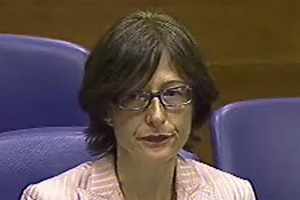
Over a year has passed since Florence Hartmann had appealed against her sentence at the International Criminal Tribunal for the former Yugoslavia (ICTY). On September 24, 2009, the Author of “Peace and Punishment, the secret war between international politics and international justice” (2007) was convicted and sentence to a fine of 7000 Euros by the ICTY for having questioned in her book and in an press article the validity of two court decisions.
In convicting Florence Hartmann, the ICTY re-imposed a form of censorship aiming to protect international judges from all forms of criticism. The long awaited Appeal judgement should therefore clarify whether the ICTY deems necessary to set new limits to freedom of speech in violation of international standards.Florence Hartmann did not disclose any parts of the Serbian State’s war archives held by the ICTY.
She was convicted for explaining how and on which legal grounds the ICTY judges had decided to forbid the disclosure of this evidential material provided by Serbia in the Milosevic case.In the name of transparency, the legal reasoning of court decisions, especially in criminal cases, are public. Since the ICTY Judges were not keen to expose to public scrutiny the reasons of their controversial decisions, they convicted Florence Hartmann of contempt of court for having reported on the functioning of the criminal justice system and so enabled the public to exercise its right to oversee the ICTY judicial activities.
However, the information published in her book and in her article Vital genocide documents concealed had long been in the public realm. It was mentioned earlier in many press accounts and even in several ICTY public Court decisions. The notion that Florence Hartmann’s book and article posed any harm to the Tribunal and justice was so absurd that it seemed trumped up to dissuade from further critical writing on the functioning of the ICTY.
Florence Hartmann was not convicted as the former ICTY prosecution spokesperson (2000-2006) but as the author of the incriminated pieces, thus in her status of journalist and investigative writer. The ICTY did not deny the information was legitimately obtained in the course of newsgathering outside the Tribunal, after Hartmann left the Tribunal.
European and American jurisprudence agree on the fact that journalists can not be ask to withhold information deemed privileged by an institution if the information is already, in part or entirely, in the public domain. By indicting and convicting Florence Hartmann, the Tribunal has set a precedent that contradicts the applicable laws in the democratic world.
The renowned international non-governmental organization Article 19 interceded with the ICTY as a friend of the court -amicus curiae – in the context of the appeals procedure in order that international conventions regarding freedom of speech be respected.
IF the first instance judgment issued over a year ago were upheld, the ICTY, by nature of its international authority status, would then definitively create legal precedents with prescriptive values which would therefore be legitimately invoked to limit freedom of speech in place of international standards in force today. In that eventuality, there would be a conflict between this new international case law and the rules set out in particular by the European Court of Human Rights (ECHR) concerning Article 10.
Source: caseflorenchartmann.org
